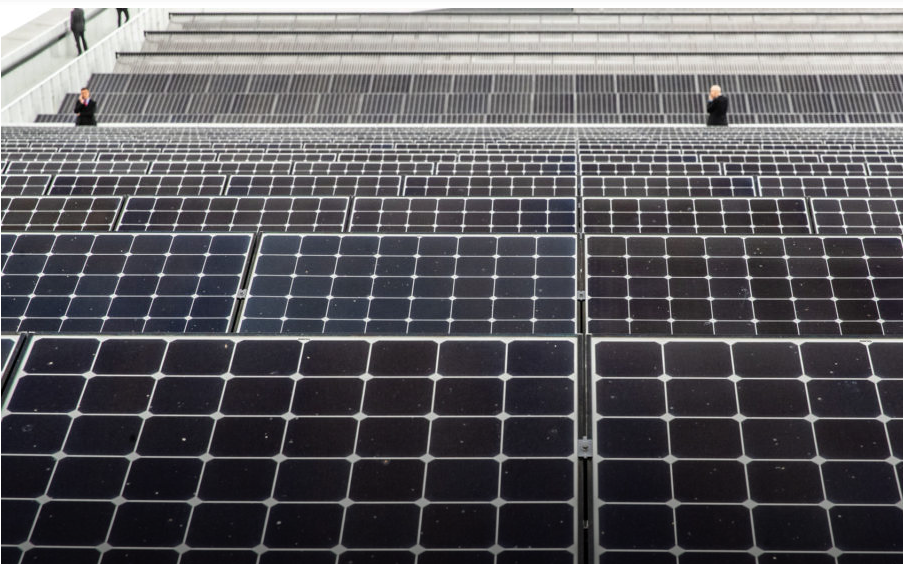
At the Hydrogen for Climate Conference in Brussels on 10 October, EU companies Hydrogenics from Belgium, Meyer Burger from Germany, Ecosolifer from Hungary, and European Energy from Denmark presented their joint proposal for the European Union’s Important Projects of Common European Interest (IPCEI), SolarPower Europe said.
The project proposal entitled Silver Frog foresees the construction of a cutting-edge 2 GW/year solar PV manufacturing facility.
According to SolarPower Europe, this factory would provide over 10 GW of installed PV capacity, also including wind, for the production of 100% renewable hydrogen, transported by gas pipelines to hard-to-decarbonise industries, such as steel and chemicals.
Over a period of eight years, the project is estimated to produce 800,000 tonnes of renewable hydrogen, and reduce 8 million tonnes of CO2 emissions, each year – approximately the CO2 footprint of the whole city of Brussels. At least 6,000 jobs are expected to be created as a result of the project.
In the proposal, Belgium’s Hydrogenics Europe would supply the water electrolysis technology, Germany’s Meyer Burger would supply the solar PV manufacturing line, Hungary’s Ecosolifer would produce the modules and focus on heterojunction technology (HJT), while Denmark’s European Energy would act as the energy developer. SolarPower Europe would offer support to its members throughout the project.
“Solar is crucial in delivering fully renewable electricity throughout Europe. The ‘Silver Frog’ project reveals how solar can facilitate the development of renewable hydrogen,” SolarPower Europe CEO Walburga Hemetsberger said. “Further, this project’s emphasis on the integration of PV manufacturing facilities sends a strong signal to the European Commission that any discussions surrounding renewable hydrogen will require a robust renewable industrial strategy,” Hemetsberger added.
Thomas Hengst, head of Global Sales at Meyer Burger, noted that the Silver Frog project has the aim of helping to deliver the EU’s Green Deal, with a focus on hard-to-decarbonise sectors. “The crucial element of our project is to develop a new European manufacturing capacity for solar PV cells and modules. The new technology has been developed in Europe and has the potential to establish sustainable and globally-competitive solar cell and module production thanks to its very high efficiency. By focusing on the production and transportation of renewable hydrogen, we can address existing and future demand, as well as offering the concept as an integrated solution,” Hengst said.
Important Projects of Common European Interest (IPCEI) on hydrogen includes eight ambitious proposals, all of which aim to develop the hydrogen sector, with projects surrounding the generation, transportation, and innovation of green hydrogen. The final selection for the IPCEI will take place in 2020, SolarPower Europe said.
The Hydrogen for Climate Action conference on 9 October in Brussels was co-organised by the European Commission’s DG GROW and Hydrogen Europe. Over 450 stakeholders from all across Europe attended the event and 1366 followed the web streaming.
The projects presented during the event will mean an investment of more than €60 billion over the next 5-10 years and, once completed, they will save 35 million tonnes of CO2 emissions per year.
“The IPCEI projects presented at the conference showed in an impressive way that hydrogen technologies are ready today for deployment. No need to wait another 10 years to reap the benefits for climate action.” said Christian Weinberger, senior adviser on Advanced Industrial Technologies and Hydrogen Coordinator, DG GROW, European Commission.
These strategic value chains are interlinked and integrated industrial activities with great potential to contribute to Europe’s green and digital transformation and to improve Europe’s competitiveness.
As such, hydrogen has been seen as having a significant role to play in decarbonising the industrial, transport and energy sectors, as it enables the production, storage and consumption of energy without emissions whilst contributing to the EU’s technological leadership, Hydrogen Europe said, adding that it can also support the EU’s efforts towards energy independence, as hydrogen-based energy can be generated within EU borders, complementing existing solar and wind energy capacities.
Furthermore, hydrogen can play a significant role globally and more specifically with other continents such as Africa and the Middle East in terms of jobs creation and climate mitigation potential, Hydrogen Europe said.
The conference attendees also witnessed the joint call from the European Automobile Manufacturers’ Association (ACEA), Hydrogen Europe and the International Road Transport Union (IRU) for the accelerated deployment of hydrogen refuelling infrastructure across the EU.